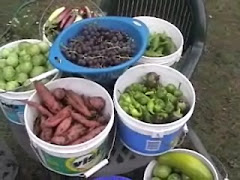
"Did you know we can grow plants to use for laundry soap" he said one day? "OK, sure, whatever" I said rolling my eyes. He showed me the articles proclaiming it's cleaning powers, it's saponins, it's sudsing action, "and they still use it in museums to clean fine fabrics" he said. Should have guessed he was serious, you would think I'd have learned by now. The soapwort was planted. It was quite lovely and grew quite well. And just before the first frost I found myself in the garden with my old kitchen shears cutting down the plants and stuffing the greens into big garbage bags and bringing them inside to make soap.

"We will try your soap experiment" I said, and so the soap making began. Those shears were used to chop the leaves and stems into smaller and smaller pieces. Huge pots of water were put upon the stove to simmer and the greens were dropped inside to extract the soap. I smashed them and mashed them and then did it some more. It was entertaining and lunatic at the same time and by days end we had 12 large detergent bottles of homemade laundry soap. At this point, I was fully engaged and decided to add a cup of vinegar to each bottle to avoid possible mold problems also knowing that vinegar was reputed to clean clothes.


And yes, we are using the laundry soap exclusively now and saving money in the process. Cold water, no bleach. Before the snow fell the clothes were hung on the line to dry. Now they are draped over drying racks in front of the fire. There is something interesting I have noticed regarding soapwort - the clothes are really soft even though not dried in the clothes dryer. Noticeably soft. I do like that. Our jeans, shirts, and sweaters are clean and fresh. Does it remove harsh stains from light colored towels and rags? No, not perfectly but I've decided in the future I will buy dark colored towels and I won't notice the difference. Does it work like Tide with bleach? No, but I know that what's being absorbed into my clothing and going down the drain is a perfectly natural ingredient. I like that too.
Endive for coffee, stevia for sugar, nicotina for organic pesticide, soapwort for the laundry, and I believe I hear rumblings about a plant that acts as a numbing agent for sore throats and toothaches. Mr. H. has repeatedly told me he can grow anything we think we need to buy. Perhaps I shouldn't second guess him anymore...
The articles below contain more in depth information regarding soapwort.
http://www.purplesage.org.uk/profiles/soapwort.htm
http://www.oardc.ohio-state.edu/weedguide/singlerecord.asp?id=280























2 comments:
How interesting. What a great way to wash your clothes. When I lived with a group of aboriginees in the 1970s (I was a nurse), they used a plant they just called 'soap plant'. It made a fine lather and was very gentle on the skin.
BTW, my mother drank chicory coffee when I was growing up and she treated toothache with cloves and sore throat with lemons. And you can also grow comfrey as a nitrogen fertiliser. It contains more nitrogen then chicken manure.
Rhonda Jean,
Thanks for the tips.
I will be making soap again this summer and will be able to include some of the roots as the plants will be two years old. They are supposed to work even better.
We are trading some of our rhubarb for a friend's comfrey this spring and look forward to exploring the benefits of it as a fertilizer.
Mrs. H.
Post a Comment